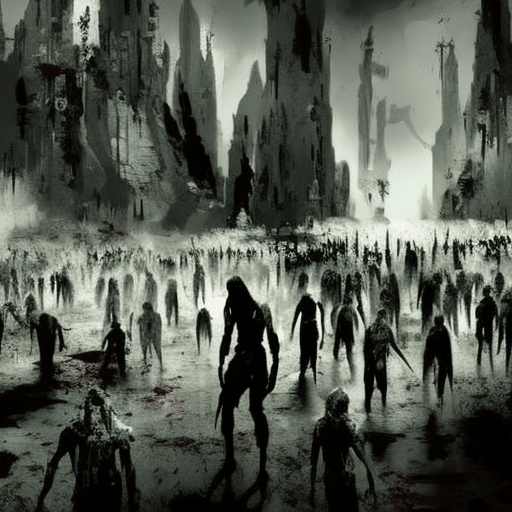World War Z: An Oral History of the Zombie War
One-line summary: World War Z is a gripping and chilling account of a global zombie pandemic, told through a collection of interviews with survivors from all walks of life.
In Max Brooks’ World War Z: An Oral History of the Zombie War, readers are taken on a harrowing journey through a world devastated by a zombie pandemic. The book is structured as a series of interviews with survivors from various countries, providing a comprehensive and chilling account of the events that unfolded during the war against the undead.
The Outbreak and Initial Response
The book begins with the outbreak of the zombie virus in China and its rapid spread across the globe. The initial response from governments and the general public is one of disbelief and denial, leading to a slow and ineffective reaction. As the infection spreads, panic ensues, and society begins to crumble under the weight of the undead threat.
Survival and Adaptation
As the world descends into chaos, individuals and communities are forced to adapt in order to survive. The book explores the different strategies employed by survivors, from fortified enclaves to nomadic groups constantly on the move. It also delves into the psychological toll of living in a world overrun by zombies, as survivors grapple with grief, fear, and the constant threat of death.
Lessons Learned and Hope for the Future
Throughout the interviews, a number of key themes emerge. One of the most prominent is the importance of preparedness and early action in the face of a crisis. The book highlights the failures of governments and institutions that were ill-equipped to handle the outbreak, emphasizing the need for proactive measures and effective leadership.
Another theme that emerges is the resilience and adaptability of humanity. Despite the overwhelming odds, individuals and communities find ways to survive and rebuild. The book showcases the strength of the human spirit and the capacity for hope even in the darkest of times.
Key takeaways from World War Z include:
- The importance of preparedness and early action in the face of a crisis.
- The resilience and adaptability of humanity in the face of overwhelming odds.
- The psychological toll of living in a world overrun by zombies.
- The need for effective leadership and proactive measures in times of crisis.
As the interviews progress, readers are confronted with the devastating consequences of the zombie war. The book does not shy away from the horrors of the conflict, painting a vivid and gruesome picture of the violence and destruction wrought by the undead. However, amidst the darkness, there are moments of hope and humanity that shine through, reminding us of the strength and resilience of the human spirit.
In conclusion, World War Z is a gripping and thought-provoking account of a global zombie pandemic. Through its oral history format, the book offers a unique perspective on the events that unfolded during the war against the undead. It serves as a cautionary tale, highlighting the importance of preparedness, resilience, and effective leadership in the face of a crisis. As readers journey through the interviews, they are left with a renewed appreciation for the fragility of our world and the indomitable spirit of humanity.
“Most people don’t believe something can happen until it already has. That’s not stupidity or weakness, that’s just human nature.”
– Max Brooks, World War Z












